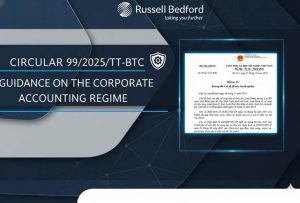Dear Valued Businesses,
Effective from 1 July 2025, the Value-Added Tax (VAT) Law 2024, Decree No. 181/2025/ND-CP, and Circular No. 69/2025/TT-BTC will come into force, introducing significant changes in VAT administration. Below is a summary of the key points businesses should note to ensure compliance with regulations and optimize their VAT obligations:
1. VAT Taxpayers
Definition of VAT taxpayers? This includes domestic enterprises, foreign-invested enterprises, business households/individuals, economic organizations under political/social organizations, and notably, foreign suppliers engaged in e-commerce or digital platform businesses in Vietnam (with VAT withheld/remitted through designated organizations in Vietnam).
Note: Businesses should clearly determine their taxpayer classification to ensure correct tax obligations. Before 1 July 2025, foreign suppliers without a permanent establishment in Vietnam were not directly responsible for paying VAT. However, from 1 July 2025, Article 2 of the VAT Law 2024 expands the scope of taxpayers to include foreign organizations and individuals providing digital services, engaging in e-commerce, or conducting business on digital platforms, even without a permanent establishment in Vietnam. E-commerce platforms are be required to withhold and remit VAT on behalf of business households and individuals operating on their platforms, while Vietnamese organizations and individuals purchasing services from non-resident foreign suppliers must withhold and pay VAT on their behalf.
Impact level: High for industries engaged in activities related to e-commerce platforms and digital services, as they will need to establish/invest in reliable systems to register, declare, and remit VAT on behalf of sellers, or to support foreign suppliers in fulfilling these obligations. Businesses that use foreign services such as advertising, marketing, or IT will be required to withhold and pay VAT on behalf of the foreign service providers.
2. Non-Taxable Goods and Services
Certain goods and services are exempt from VAT, including:
- Agricultural, livestock, and aquatic products that are unprocessed or only preliminarily processed (e.g., cleaning, drying, milling, chilling…).
- Public housing assets sold by the State to current tenants.
- Financial, banking, and securities services (e.g., credit provision, securities trading, capital transfers).
- Funeral services, education and vocational training services, and certain public works funded by community contributions or humanitarian aid.
Note: Goods and services exempt from VAT are not eligible for input VAT deduction, except in cases where the 0% VAT rate applies (such as exports).
Impact level: High for businesses whose goods or services will be exempt from VAT starting 1 July 2025, posing several challenges: ineligibility for input VAT deduction, risk of tax reassessment, stricter documentation requirements, and potential impact on selling prices and profit margins. Industries might significantly affected include agriculture, fisheries, healthcare, education, and businesses engaged in import and distribution.
3. Non-Cash Payments from VND 5 million
New regulation: Purchases of goods or services (including imports) with a value of VND 5 million or more (VAT-inclusive) must be supported by non-cash payment documents to be eligible for input VAT deduction.
Special cases:
- If multiple purchases are made in a single day and the total value reaches VND 5 million or more, non-cash payment documentation is still required.
- Certain specific cases (such as offsetting receivables and payables, authorized payments through a third party, or deferred/instalment payments) remain eligible for deduction if supported by valid contracts and documentation.
Note: Businesses should review their payment processes to ensure the use of bank transfers or other non-cash payment methods to avoid denial of VAT deduction starting 1 July 2025 (previously, the threshold was VND 20 million).
Impact level: Significant for small and medium-sized enterprises (SMEs), which may face greater challenges due to reliance on cash transactions and the need to invest in payment systems and staff training.
4. Taxable Value and Timing of VAT Determination
On the taxable value for VAT purposes:
- Sales of goods and services: Price exclusive of VAT.
- Goods subject to special consumption tax or environmental protection tax: Taxable value includes these taxes but excludes VAT.
- Imported goods: Taxable price is the import price plus import tax, special consumption tax, and environmental protection tax (if any).
On the timing of VAT determination:
- Exports: At the time goods are cleared through customs.
- Imports: At the time import duty is determined.
- Telecommunications, real estate, and construction services: Specific rules apply to determine the timing.
Note: Businesses must ensure invoices and supporting documents are valid to accurately determine the taxable value and timing. The codification of VAT determination timing, together with new invoicing time requirements, will enhance transparency and reduce disputes during tax audits. However, businesses should update their invoicing procedures to align with the new timing rules.
Impact level: Moderate, as the changes may increase costs for imported goods.
5. VAT Rates
0% rate: Applies to exported goods and services, services provided to foreign organizations/individuals, subject to having a valid contract, non-cash payment documents, and customs declarations.
5% rate: Applies to fertilizers, plant protection products, medical equipment, and similar items.
10% rate: Applies to all other goods and services (except special cases).
Note: Businesses should carefully review the list of goods and services to ensure correct rate application. Before 1 July 2025: The three-tier rate structure (0%, 5%, 10%) remains, but the conditions for applying the 0% rate lack instruction detail.
From 1 July 2025: The three-tier rate structure remains, but the 0% rate list is expanded with clearer criteria, including digital services exports, international transport, and toll manufacturing.
Impact level: Moderate for businesses exporting digital services and providing international transport; minorfor mining, energy production, real estate, construction, and insurance sectors, as the clearer VAT rate lists help reduce the cost of verifying cost allocation ratios.
6. Deduction Method and VAT Refunds
Deduction Method: Applicable to enterprises with annual revenue from VND 1 billion or more, or those that voluntarily register. Output VAT is deducted by eligible input VAT.
Note: Before 1 July 2025: The deduction method applies to enterprises with annual revenue of more than VND 1 billion, but without clear requirements on revenue segregation. After 1 July 2025: The deduction method requires annual revenue of more than VND 1 billion, with complete accounting records and invoices (Article 12).Businesses below the threshold but with proper invoices may voluntarily apply.
Impact level: Medium to High for small enterprises with revenue below VND 1 billion/year using the direct deduction method who must apply new percentage rates, potentially increasing costs. Multi-sector businesses must clearly segregate revenue to avoid being subject to the highest applicable rate.
VAT Refunds: Applicable when the remaining undeducted input VAT reaches VND 300 million or more, or for projects funded by ODA or humanitarian aid.
Note: Businesses must prepare complete, valid invoices and supporting documents, and verify eligibility for deduction/refund. Before 1 July 2025: The VAT refund process lacked detailed guidance, especially for goods and services for export or those subject to the 5% rate. Complex documentation often led to disputes. After 1 July 2025: Decree 181 and Circular 69 clearly stipulate refund procedures for exported goods and services, 5% tax-rated products, and refund conditions for transactions via overseas e-commerce platforms.
Impact level: Medium to High for affected sectors, including Exports; exporters of goods and digital services benefit from a more transparent VAT refund process, though subject to stricter documentation requirements – and 5% VAT-rated goods manufacturing – producers of food, pharmaceuticals, and medical equipment must prepare detailed documentation to qualify for refunds.
7. E-Invoicing and Tax Management
The use of e-invoices is mandatory to ensure transparency and compliance with tax regulations. Businesses should select reputable providers to meet the requirements under Circular 32/2025.
Note: Update accounting processes, software, and review tax policies to integrate e-invoicing, minimizing risks during tax audits. Before 1 July 2025: Provisions on prohibited acts (such as buying/selling invoices, issuing false invoices) were general and lacked strong legal enforcement tools. After 1 July 2025: The VAT Law 2024 (Article 13) and Decree 181 specify eight prohibited acts, including: buying/selling invoices, issuing false invoices, failure to transmit e-invoice data to tax authorities, and fraudulent VAT deduction or refund claims.
Impact Level: High impact for affected sectors, including Exports, Construction, and Trade which frequently engage in VAT deduction and refunds and are subject to audit over the validity of invoices and documentation and Businesses using e-invoices all companies must ensure timely transmission of e-invoice data.
8. Immediate Actions Required
Review procurement and sales processes: Ensure non-cash payments for transactions of VND 5 million or more. Maintain full control and proper storage of invoices and non-cash payment documents in line with the new regulations. Be fully aware of applicable VAT rates for goods and services.
Check goods/service list: Clearly identify items subject to VAT, exempt from VAT, the applicable VAT rates, and those eligible for the 0% VAT rate.
Update accounting software and new VAT declaration/refund rules: Ensure compatibility with e-invoicing and the latest regulations. Determine the VAT tax point accurately to declare in the correct tax period. Monitor VAT refund regulations to optimize cash flow and tax obligations.
Seek tax expert advice: Contact us for tax consultation and documentation review to provide clear guidance, avoid errors, and ensure VAT compliance and optimization. Businesses are advised to work closely with the tax accounting department or tax consultants at Russell Bedford KTC to stay up to date with all relevant regulation updates.
Conclusion
Decree 181/2025/NĐ-CP and Circular 69/2025/TT-BTC provide a clear legal framework to help businesses optimize VAT obligations while promoting cashless payments and enhancing transparency in accounting and taxation. Businesses should promptly update their processes, prepare valid documentation, and review VAT tax policies to ensure compliance and mitigate risks from 1 July 2025.
Sincerely,
Russell Bedford KTC
(KTC Auditing Co., Ltd.)


















